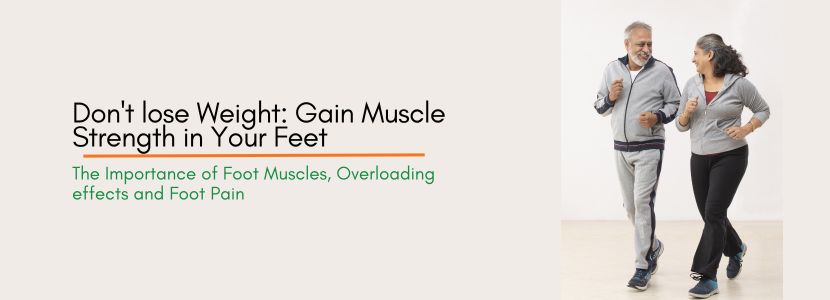
Reading time : 10mins Langauge : English
When it comes to physical fitness, many individuals focus on losing weight or building muscle in the upper body, often neglecting the strength and health of their feet. However, the muscles in our feet play a vital role in our overall well-being, balance, and mobility. In this blog, we will delve into the importance of foot muscles, the consequences of overloading them, and how underdeveloped foot muscles can lead to foot pain and discomfort.
The Importance of Foot Muscles:
Balance and Stability: Foot muscles are responsible for maintaining balance and stability. They provide the necessary support and strength to navigate various terrains, preventing falls and injuries.
Shock Absorption: The foot muscles work in conjunction with other structures, such as tendons and ligaments, to absorb the impact of walking, running, or jumping. Strong foot muscles help distribute the force evenly, reducing the strain on the joints and minimizing the risk of overuse injuries.
Arch Support: The muscles in the feet help maintain the natural arches of the foot, providing stability and proper weight distribution. A well-developed arch helps absorb shock, prevents excessive pronation or supination, and reduces the likelihood of conditions like plantar fasciitis or flat feet.
Propulsion and Mobility: Strong foot muscles allow for efficient propulsion during activities like running or jumping. They contribute to the overall power and speed of movement, enhancing athletic performance.
Overloading Effects on Foot Muscles:
Foot Fatigue: Overloading foot muscles through excessive physical activity, prolonged standing, or wearing improper footwear can lead to muscle fatigue. When the muscles become fatigued, they are less effective in providing stability and shock absorption, increasing the risk of injury and foot pain.
Plantar Fasciitis: Overloading the foot muscles and structures, particularly the plantar fascia (a thick band of tissue on the bottom of the foot), can lead to plantar fasciitis. This condition causes pain and inflammation in the heel and arch area, making walking and other activities uncomfortable.
Achilles Tendinitis: Intense physical activity without proper conditioning can strain the Achilles tendon, resulting in Achilles tendinitis. This condition causes pain and inflammation in the back of the heel, affecting mobility and leading to chronic discomfort.
The Effects of Underdeveloped Foot Muscles:
Flat Feet: Weak foot muscles can contribute to the development of flat feet, where the natural arch of the foot collapses or becomes less prominent. Flat feet can cause foot pain, instability, and an increased risk of other foot conditions.
Foot and Ankle Instability: Underdeveloped foot muscles may result in reduced strength and stability in the foot and ankle. This instability can lead to recurrent sprains, strains, and falls, hindering overall mobility and quality of life.
Misalignment and Overpronation: Insufficient muscle strength in the feet can cause biomechanical imbalances, leading to overpronation (excessive inward rolling of the foot) during walking or running. Overpronation can contribute to various foot problems, including plantar fasciitis, shin splints, and knee pain.
Addressing Foot Pain and Building Foot Muscle Strength:
Foot-Specific Exercises: Engaging in foot-specific exercises can help strengthen the muscles in your feet. Exercises such as toe curls, marble pickups, towel scrunches, and heel raises can target different foot muscles, improving their strength and function.
Barefoot or Minimalist Footwear: Incorporating barefoot or minimalist footwear into your routine can help activate and strengthen the foot muscles. Such footwear allows for natural foot movement and provides sensory feedback, encouraging proper muscle activation and balance.
Gradual Progression: When starting a foot exercise routine, it’s important to progress gradually and listen to your body. Start with simple exercises and gradually increase intensity and duration to avoid overloading the muscles and risking injury.
Proper Footwear Selection: Choosing footwear that provides adequate arch support, cushioning, and a proper fit is crucial for foot health. Avoid shoes that are too tight or too loose, as they can restrict proper muscle movement and lead to discomfort.
Consult a Professional: If you’re experiencing persistent foot pain or have concerns about your foot health, it’s advisable to consult someone who assess your foot mechanics, provide personalized advice, and recommend appropriate options. We, Care Catalyst Foot Lab also do such kind of assessment and provide with appropriate footwear/insoles.
In the pursuit of overall physical fitness, we must not neglect the importance of foot muscle strength. Strong foot muscles play a vital role in balance, stability, shock absorption, and mobility. Overloading the foot muscles or having underdeveloped foot muscles can lead to foot pain, discomfort, and increased susceptibility to injuries. By incorporating foot-specific exercises, wearing proper footwear, and seeking professional guidance when needed, we can address foot pain, improve foot muscle strength, and enhance our overall foot health. Prioritizing foot muscle strength will not only contribute to better foot function but also positively impact our overall well-being and quality of life
Want to learn Foot Specific exercises? We are here to assist. You can download our Free Guide “15mins to Happy Feet“. For personal assistance you can book a free call with us to take up 1:1 coaching or a self paced class.


